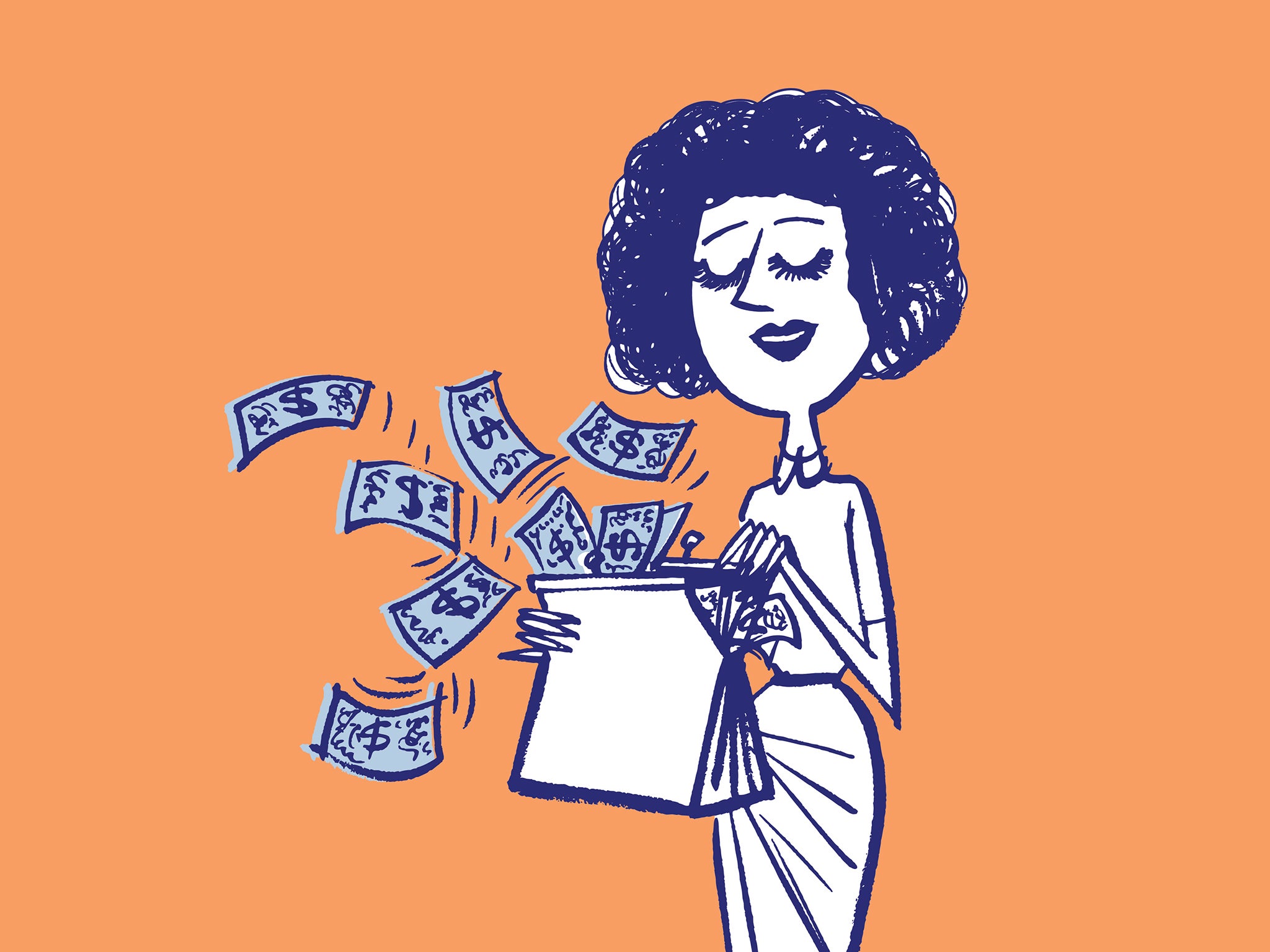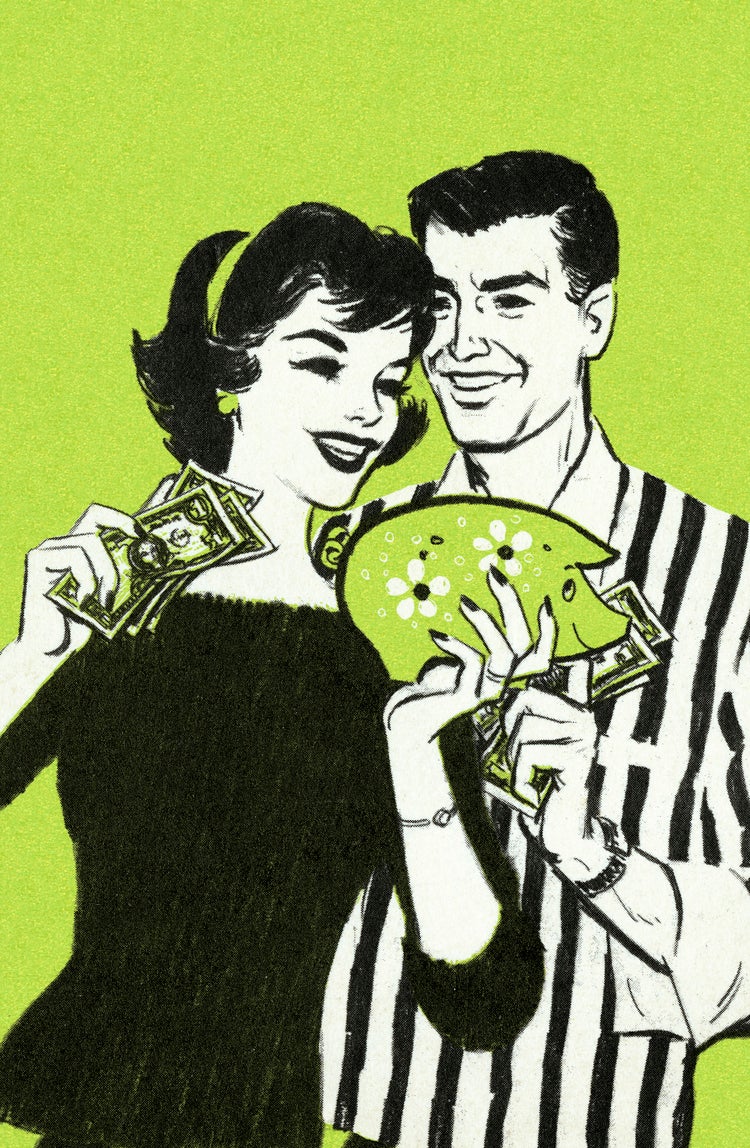Still broke? Influencers think you’re just not ‘manifesting’ money hard enough
The cost of living crisis has sparked a cottage industry of influencers claiming that merely thinking positively and communicating with the universe will send riches your way. Too many people are falling for it, writes Eloise Hendy


Your support helps us to tell the story
From reproductive rights to climate change to Big Tech, The Independent is on the ground when the story is developing. Whether it's investigating the financials of Elon Musk's pro-Trump PAC or producing our latest documentary, 'The A Word', which shines a light on the American women fighting for reproductive rights, we know how important it is to parse out the facts from the messaging.
At such a critical moment in US history, we need reporters on the ground. Your donation allows us to keep sending journalists to speak to both sides of the story.
The Independent is trusted by Americans across the entire political spectrum. And unlike many other quality news outlets, we choose not to lock Americans out of our reporting and analysis with paywalls. We believe quality journalism should be available to everyone, paid for by those who can afford it.
Your support makes all the difference.On TikTok, a young woman is claiming that she’s “done gatekeeping”. She wants to tell us the one affirmation she uses to make “hella money”. In typically self-assured style, she reels off a single sentence, one she claims has been answered over and over again by the universe. “I get paid to exist,” she says. “My existence pays for itself.” Nearly 150,000 people have liked it. Among an array of adulatory comments, one less impressed take cuts through: “You have 1.9 million followers, of course you get paid to exist”.
The subtle art of achieving health, wealth, happiness and your deepest desires simply by willing them into existence – otherwise known as “manifestation” – is all the rage. Particularly when it comes to conjuring cash. And quickly. Can’t pay your rent, or afford a holiday? According to the “manifestation coaches” of TikTok, all you need to do is chant “money comes to me easily, money comes to me fast,” while blowing cinnamon over the threshold of your front door. Or you could wrap a tenner around a cinnamon stick and carry it around in your wallet. When it comes to manifestation techniques, the options seem almost endless. Indeed, the hashtag #moneymanifestations has clocked up over 125 million views, while #moneyaffirmations has gained 40 million views and counting. To put it in perspective, that’s roughly the population of California, or more than half the population of the entire UK. Whichever way you look at it, that’s a lot of people trying to get rich by harnessing the vast, unknowable abundance of the universe using just the power of their minds. And occasionally a selection of aromatic condiments.
So what is going on exactly? Why is everyone suddenly attempting to summon money by maintaining “positive energy”? Why are so many people viewing “the universe” like a benevolent benefactor just itching to write them cheques? More importantly, is the so-called “abundance expert” just a fancy, contemporary way of saying “scam artist”?
The fact that people are turning to the internet for financial advice is hardly surprising. For as long as search engines have existed, they’ve acted like a collective unconscious of sorts; a universe haunted by humanity’s desires and fears. The three ghosts in this machine – the restless spirits that keep being raised from the dead – are beauty, wealth and health. “How to lose weight”. “How to make money”. “Does this mole/headache/unidentified discomfort mean I’m dying”. It’s also unsurprising that the number of people throwing that second phrase into their nearest or dearest search bar has surged recently, especially in the UK. Given the current cost of living crisis, ongoing wage stagnation, and, for many dedicated and hardworking employees in the rail, mail, health, education, refuse, and legal industries, a couple of paychecks sacrificed to strike action, it would be pretty shocking if people weren’t hunting for quick, easy and effective ways to bulk out their bank balances.
Back in the “good old days” of recessions past, advice might tend towards suggesting people take thousands of surveys, start an unspecified “online business”, or sell their furniture, clothes, or organs. Now the wisdom of the internet seems to have decisively tipped into the mystical. Instead of being career-coached into a series of ever more outlandish side hustles, an increasing number of young people are being manifestation-coached to, more or less, “cross your heart and hope for the best”. Or, more succinctly, to embrace “positive vibes”.
If I sound sceptical of this new boom in spiritual financial advice, it’s not because I don’t understand the appeal of the idea that it’s possible to will money or love into existence just by visualising it. It is an undeniably attractive way of thinking. And – credit where credit’s due – there is probably some truth in the essential notion that positive thinking and approaching the world in gratitude can alter your experiences, like an emotional placebo effect. What I am sceptical of, however, is the idea that it can whisk unexpected thousands into your bank account in the form of “uncashed cheques” or vague “prizes”. More than that, I’m sceptical of these manifestation TikTok girlies and the entire cottage industry that has sprung up around ambiguously spiritual tips for financial gain. They all seem to hover somewhere between retro life coaching and modern influencing, at the by-now well-trod intersection of witchiness and wellness.
It’s important to recognise that, just like Google searching what your moles should look like, manifestation isn’t really anything new. The claim that eternal happiness and riches can be “attracted” by maintaining a positive emotional state moved from the New Agey margins to the mainstream in 2006. That was when the spirituality documentary The Secret was published, followed by the publication of Rhonda Byrne’s self-help book of the same name. An inevitable cast of celebrities jumped on the “law of attraction” theory The Secret espoused, including Ellen DeGeneres, Will Smith, Jim Carrey, and the queen of self-help and pseudoscience Oprah Winfrey – all of whom, of course, were quick to credit their stardom and success to the abundant, all-generous universe. Since being given the Oprah seal of approval, The Secret has spawned a veritable commercial empire. At its root is the idea that staying positive at all times will lead to fame and fortune.
A clear line can be drawn between the rise of The Secret and the modern wellness industry, too. The tarot resurgence. Protective amulets that look and cost a lot like regular high-end jewellery. Gwyneth Paltrow selling crystal-infused water bottles. All of these “law of attraction” girlies are part of a wider economy of influencers building personal brands from “witchy” aesthetics. All are selling the idea that spiritual and material enrichment can and should be intertwined.
The truth is that many people are making a lot of money from manifestation – but it’s not the people hoping that powdered cinnamon will help them pay their rent. Rather it’s the TikTok and Instagram “creators” building vast and lucrative followings from the idea that money will flow to you if you just believe it will. Ultimately, what these manifestation creators are doing is simply capitalising on people’s anxieties, fears and fantasies.

Perhaps none of this would matter so much if the narrative of “money manifestation” wasn’t so intrinsically insidious and damaging. For underneath the guise of “positive vibes”, manifestation is rooted in a highly individualistic, blame-the-victim mentality. Like compulsory mindfulness training days at work, the emphasis is on adjusting your personal emotional state, rather than attempting to change the things putting you under pressure in the first place.
The sociopolitical structure you’re living under isn’t the problem, this mindset says. Your way of thinking is the problem. You are the problem. One video that currently has over 38,000 likes on TikTok sums this up so perfectly that I at first thought it was satire. In it, Giulia, a self-described “NYC Creator x CEO”, acts out a dialogue with the universe. “I just don’t have enough and I’m constantly living paycheck to paycheck,” she says in character. She wonders if it’s because her job doesn’t pay her what she’s worth. “No, silly,” the universe scolds back at her. “[It’s] because you’re coming from a place of lack,” it insists. Of course! Don’t ask for a pay rise! Don’t go on strike! Don’t protest precarious working conditions! Just think good thoughts! Still poor? Well then, oops, you must not be trying hard enough.
Manifestation might look like magic, but really it’s just the old, regressive notion of the deserving and undeserving poor. Only this time with a bit of cinnamon dusting.



Join our commenting forum
Join thought-provoking conversations, follow other Independent readers and see their replies
Comments